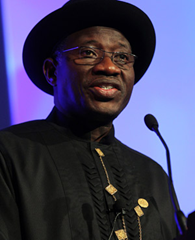|  Lagos - The party that has controlled Nigeria's presidency since a return to civilian rule in 1999 has found itself in unfamiliar territory, rocked by dissent and facing a stronger opposition. Lagos - The party that has controlled Nigeria's presidency since a return to civilian rule in 1999 has found itself in unfamiliar territory, rocked by dissent and facing a stronger opposition.
The combination of internal dissent against President Goodluck Jonathan as well as serious efforts by the country's main opposition groups to unite have come amid early strategising for 2015 polls. Whether the ruling People’s Democratic Party can iron out its differences and fend off the opposition will have huge implications for Africa's most populous nation and largest oil producer. The crucial 2015 vote will come after years of deadly Islamist attacks in the north and with oil theft in the south estimated to cost the country around $6bn per year in revenue. "The party may lose the next election unless genuine efforts to reconcile the aggrieved members are made," said Laja Odukoya, a political science lecturer at the University of Lagos. Division | | Others, however remain more optimistic, believing the PDP remains a behemoth more than capable of righting the ship, flush with cash and with the power of the presidency. Still, the challenges facing the party cannot be underestimated. The latest development came on Saturday, when a PDP convention in Abuja exposed the party's divisions. Seven of the party's 23 state governors (Nigeria has 36 states) along with others, including former vice president Atiku Abubakar, walked out of the event and met nearby for a parallel meeting of what they now call the real PDP. The rift had been in the making for months, with factions within the party opposed to Jonathan's re-election and several members believed to be plotting their own run. Regional politics have combined with personal ambitions and other factors to create shifting alliances.
continued |

 Pourquoi ceci ? Pourquoi cela ? Tout ce que vous avez envie de savoir sur et autour du Bénin ... Osez le demander à ÉTÈWUTU.com
Pourquoi ceci ? Pourquoi cela ? Tout ce que vous avez envie de savoir sur et autour du Bénin ... Osez le demander à ÉTÈWUTU.com
Les commentaires récents